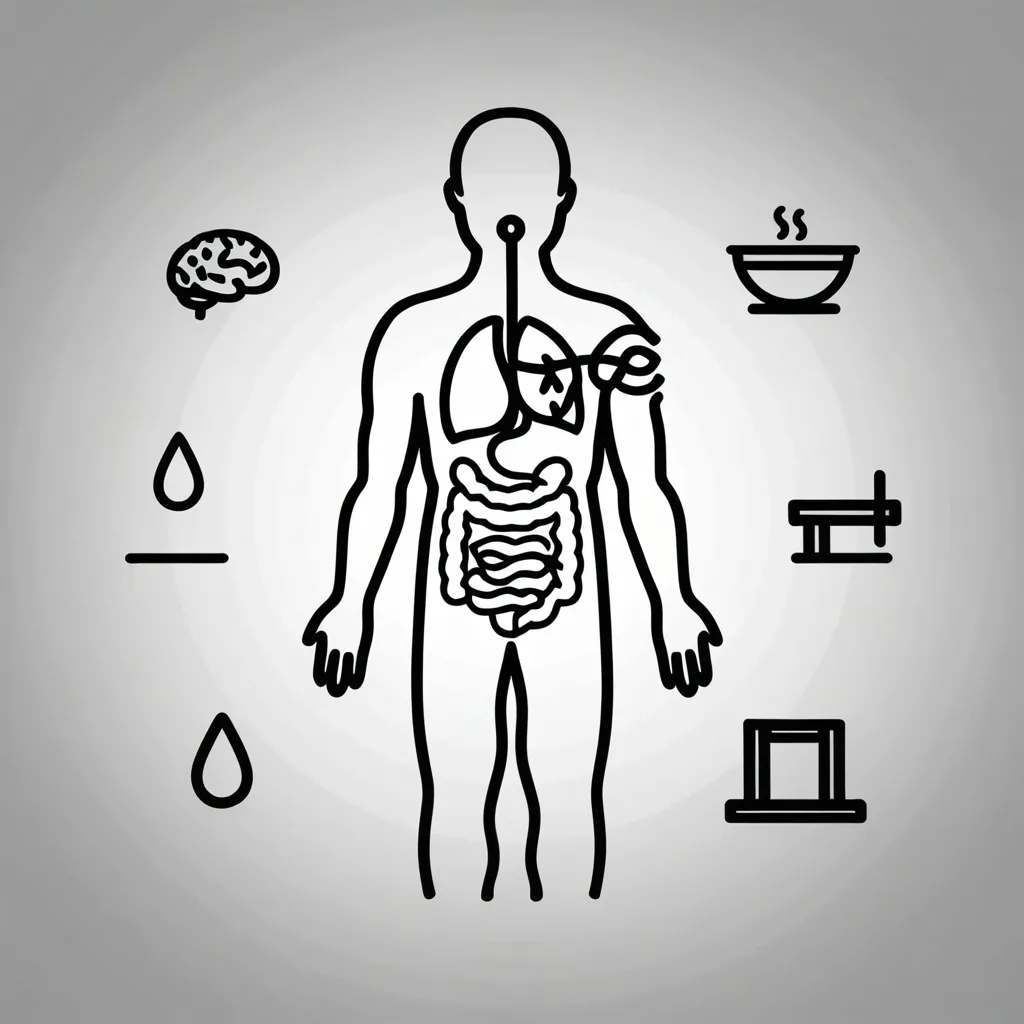Metabolism: Debunking Myths and Embracing Reality
Let’s talk about metabolism, folks. It’s one of those buzzwords that gets thrown around a lot, especially when it comes to weight loss and energy levels. But what’s the real deal? Is it really the magical solution some people make it out to be?
Truth is, metabolism is way more complex than most of us realize. It’s not just about burning calories faster - it’s about how your body uses energy from the food you eat. And here’s the kicker: a lot of what we thought we knew about metabolism is actually wrong.
For starters, that whole idea about metabolism slowing down as you age? Not entirely true. Recent studies show that our daily energy burn stays pretty steady from our 20s to our 60s. So much for blaming middle age for those extra pounds!
Now, let’s talk body composition. This is where things get interesting. Your muscle mass plays a huge role in your metabolic rate. Why? Because muscles are like little energy-burning factories in your body. They’re always working, even when you’re chilling on the couch. So, if you want to give your metabolism a real boost, hit the weights. Building muscle is one of the best things you can do for your body’s energy-burning potential.
But what about diet? Well, there’s no magic food that’ll suddenly make your metabolism go into overdrive. But that doesn’t mean what you eat doesn’t matter. Far from it! Focusing on whole foods like veggies, beans, nuts, and fruits can make a big difference. These foods are packed with fiber, which is great for your gut health. And a happy gut means a more efficient metabolism.
Here’s a pro tip: start your day with some Greek yogurt. It’s got these amazing little things called probiotics that balance out your gut bacteria. And guess what? That can actually help speed up your metabolism. Pretty cool, right?
Now, let’s talk about something that often gets overlooked - hydration. Yep, good old water. Sometimes when you think you’re hungry, you’re actually just thirsty. Drinking enough water helps your body break down fat and keeps all your metabolic processes running smoothly. It’s such a simple thing, but it can make a huge difference over time.
Exercise is another big player in the metabolism game. But here’s the thing - it’s not just about logging more miles or spending more hours at the gym. In fact, doing too much cardio can actually backfire. Your body’s pretty smart, and it’ll start compensating by reducing energy expenditure in other areas.
So what’s the answer? Strength training, my friends. Remember those muscle factories we talked about earlier? Well, a 20-minute strength training session can keep your metabolism revved up for hours afterward. That means you’re burning more calories even when you’re not working out. Pretty sweet deal, if you ask me.
Now, let’s talk about something that doesn’t get nearly enough credit when it comes to metabolism - sleep. Yep, catching those Z’s is crucial for keeping your metabolism humming along. When you don’t get enough sleep, it messes with your hormones. Your cortisol levels go up, your testosterone levels go down, and your metabolism slows down as a result.
Get this - a study from the University of Chicago found that people who only got 5.5 hours of sleep a night for two weeks lost 55% less fat than those who got enough sleep. That’s huge! So aim for 7-9 hours of sleep each night. Your metabolism will thank you.
Intermittent fasting has been getting a lot of buzz lately as a way to boost metabolism. But the science isn’t as clear-cut as some people would have you believe. While fasting can help you eat fewer calories overall, it doesn’t necessarily speed up your metabolism. In fact, some studies suggest that severely restricting your calories can actually slow down your metabolism over time. The jury’s still out on this one, so approach with caution.
Here’s something really interesting - we’re all different when it comes to metabolism. Scientists have identified different metabolic “types” or phenotypes. Some people have what’s called a “thrifty” metabolism, which means their bodies are really good at saving energy during times of scarcity. Others have a “spendthrift” metabolism, which burns through energy even when food is scarce.
Knowing your metabolic type can help you figure out the best approach for your body. If you’re the type who gains weight easily, you might have a “thrifty” metabolism. In that case, you might benefit from a diet that focuses on maintaining lean muscle mass and avoiding excessive calorie intake.
Now, let’s talk about sustainability. This is key, folks. There are no quick fixes or miracle solutions when it comes to metabolism. Those fad diets and supplements that promise to “boost your metabolism” overnight? They’re usually based on junk science and can even be harmful.
Instead, focus on building healthy habits that you can stick with long-term. Regular exercise, a balanced diet full of whole foods, staying hydrated, and getting enough sleep - these are the foundations of a healthy metabolism. They might not give you overnight results, but they’ll serve you well in the long run.
Think about it this way - your metabolism is like a complex machine. It needs the right fuel, regular maintenance, and proper care to run efficiently. You wouldn’t expect your car to run well if you filled it with the wrong fuel and never changed the oil, right? Same goes for your body.
So, what does all this mean for you? Well, it means that boosting your metabolism isn’t about finding some magic bullet. It’s about understanding how your body works and making informed choices that support your overall health.
Start by taking a look at your diet. Are you eating plenty of whole foods? Getting enough protein to support muscle growth? Drinking enough water? These are all important factors in maintaining a healthy metabolism.
Next, think about your exercise routine. If you’re not already doing strength training, consider adding it to your workout plan. Even just a couple of sessions a week can make a big difference. And remember, it’s not about lifting super heavy weights - bodyweight exercises can be just as effective.
Don’t forget about sleep. If you’re constantly burning the candle at both ends, your metabolism is probably suffering. Try to establish a consistent sleep schedule and aim for those 7-9 hours each night.
And finally, remember that everyone’s body is different. What works for your friend or that fitness influencer on Instagram might not work for you. Pay attention to how your body responds to different foods and types of exercise. Keep a journal if it helps. Over time, you’ll start to understand what works best for your unique body and metabolism.
The key here is patience and consistency. You’re not going to transform your metabolism overnight. But with time and effort, you can create a metabolic environment that supports your energy needs and helps you maintain a healthy weight.
Remember, it’s the small, consistent changes that make the biggest difference over time. Maybe you start by swapping out your afternoon soda for water. Or you add a short strength training session to your routine twice a week. These might seem like small steps, but they add up over time.
And here’s the best part - as you start to make these changes, you’ll likely notice other benefits beyond just your metabolism. You might find that you have more energy throughout the day. Your mood might improve. You might even sleep better at night. It’s all connected, and it all contributes to your overall health and wellbeing.
So, let’s ditch the metabolism myths and focus on what really matters - taking care of our bodies in a sustainable, long-term way. It might not be as exciting as a “miracle metabolism booster,” but it’s a whole lot more effective in the long run. And isn’t that what we’re really after?
Remember, your body is amazing. It’s capable of incredible things. By understanding how it works and giving it what it needs, you’re setting yourself up for a healthier, happier life. And that’s something worth working towards, don’t you think?






